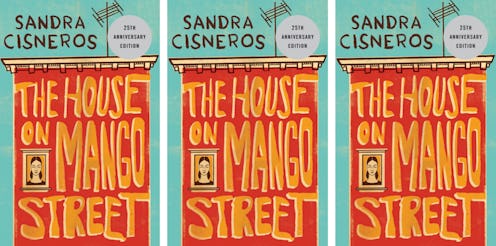Books
This Book Taught Me The Power Of Carving Out Your Own Space In The World

I've said it before and I'll say it again: representation is crucial. Whether it is seeing yourself through a fictional character in a novel or TV show, or finding a community of people like you, feeling represented in the way that you want to is everything. For many people, The House On Mango Street does exactly that. It's a feminist tale of a young Chicana (a woman of Mexican origin) named Esperanza, who tells her story through a series of vignettes as she grapples with her Mexican American identity and her feminism. The novella serves to represent and make a space for an underrepresented group in society.
"A las Mujeres — To the women" the House On Mango Street dedication reads, as author Sandra Cisernos simultaneously acknowledges the bilingual — or, in other words, Spanglish — nature of the story she's about to tell, and the intention she has of creating a female space in a male-dominated world. The title of Cisernos' novella is a nod to Virignia Woolf's A Room Of One's Own, and there are references to this work throughout. Within A Room Of One's Own, Woolf penned the famous line "a woman must have money and a room of her own if she is to write fiction," and many elements of Cisernos' story revolve around this sentiment. I guess House On Mango Street could be considered a modern re-telling of the 1920s classic in some ways.
The House On Mango Street follows the story of Esperanza's life as a Chicana in a Hispanic area in the U.S. city of Chicago. The area is deeply impoverished and, as Esperanza grows up, she realises that she can't live there forever. Esperanza is creative and intelligent, with dreams of becoming a writer, but her world presents only two options for women: La Virgen de Guadalupe and La Chingada (also known as La Malinche). The former is the Virgin Mary, while the latter is known for her "betrayal of her people and for her sexual transgressions," says Alexandra Fitts, a member of the Department of Foreign Languages and Literatures at the University of Alaska.
The Malinche and Guadalupe archetypes are so ingrained in Esperanza's community that, in order for her to create the life she wants for herself, she must inevitably leave some things behind. And the results are pretty heartbreaking.
The book was written in 1984, and soon became one of the key texts in Chicana literature. Published just 35 years ago, this novella is — in my opinion — already a fully fledged classic. The House On Mango Street spoke to me on so many levels, especially in terms of grappling with a dual identity. As previously mentioned, it's written in Spanglish, dropping in the occasional Spanish word among the English prose. The House On Mango Street also tackles the idea of racial prejudice — something which is all too familiar to me. A group of white people accidentally find themselves in Esperanza's area and are immediately scared of the Hispanic people and their brown skin because they think they are dangerous. Although I have never experienced this exact situation, I found solace in knowing that I'm not the only one who faces this kind of judgement from others.
The way in which feminism is written in this novella will connect with many women around the world, especially those from ethnic minorities. Esperanza struggles with the gender ideals pertaining to her community's culture. The majority of the women in the story conform to these roles and, as a result, are trapped in abusive marriages or are deeply unhappy. Esperanza's name translates to mean 'hope,' and she is exactly that — a pillar of hope and strength. In some ways, she gives a voice to the voiceless.
One of the best things about The House On Mango Street is that you can finish it in one sitting (but it will leave you wanting more). The books is only 110 pages long. If you liked A Room Of One's Own and are inspired by feminist narratives, this is definitely for you. A story about hope and one woman's unbridled strength as she navigates her way through restrictive gender roles and carves herself the life she wants for herself. In case you haven't figured this out already: I'm a huge fan. And trust me, you'll be too.